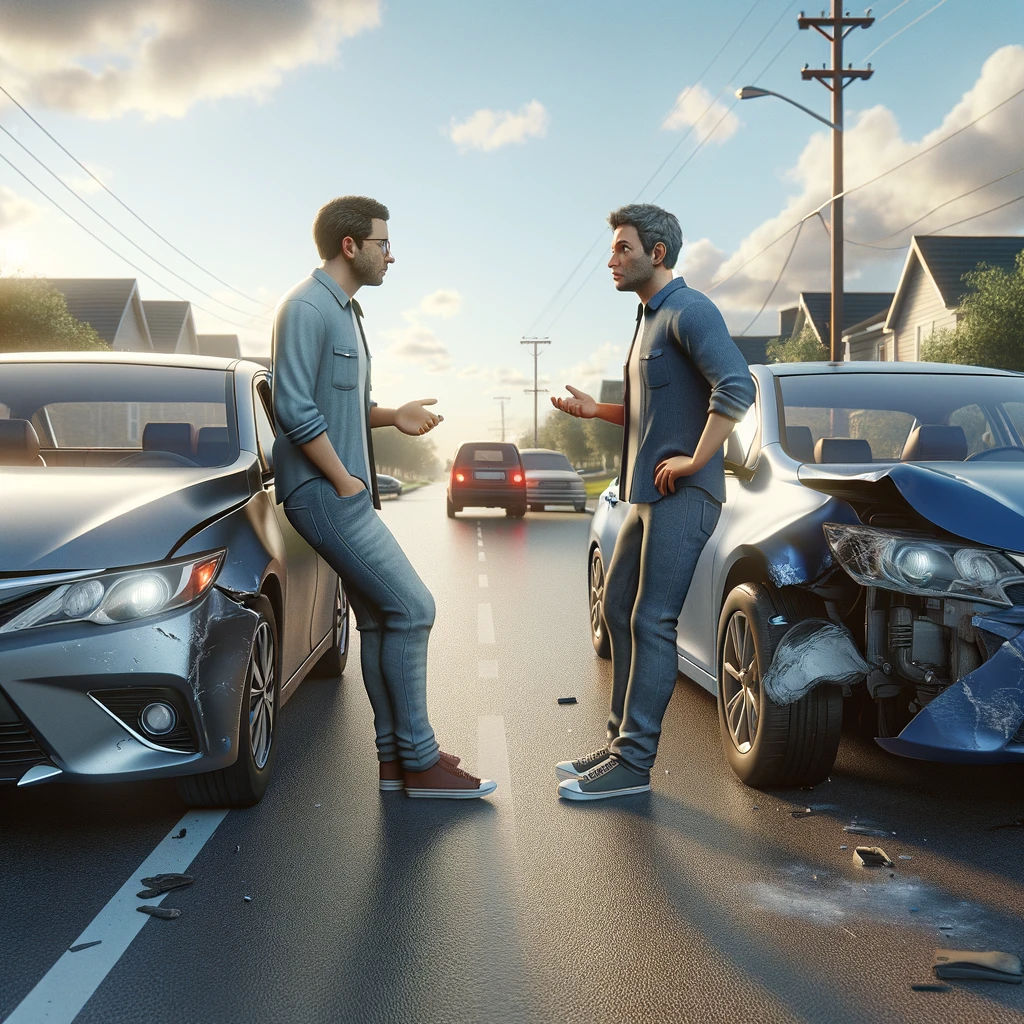I Was Hit By an Uninsured Driver. What Happens Now?
When you’re in a car accident with an uninsured driver, the immediate steps include ensuring safety, calling the police, and seeking medical attention. Unfortunately, accidents involving an uninsured driver with no liability insurance complicate the process of compensation for injuries and car repairs. After the accident, it’s crucial to gather information such as the police report, witness statements, and pictures of the scene. This evidence is vital for your insurance claim.
Even without the at-fault driver’s auto insurance information, your car insurance company needs these details to process your claim. It’s also essential to monitor your injuries and keep all medical records, as these documents will be critical if you need to pursue a claim under your uninsured motorist coverage to seek compensation for medical bills and other losses. If you need legal assistance, please fill out a contact form, or text us at 512-677-5003.
Your Own Uninsured Motorist Coverage and Other Forms of Insurance Can Help, but a Lawsuit Against an Uninsured Driver Can Be a Dead End
Utilizing your own insurance coverage can be the most effective way to cover damages. While suing the at-fault driver is an option, it often proves fruitless if they lack sufficient assets. Your uninsured motorist coverage is designed to fill the gap left by the other driver’s lack of insurance, covering expenses for bodily injury and, in some policies, property damage.
It’s a valuable part of your auto insurance policy that ensures you’re protected financially, even when the other driver isn’t. However, it’s important to understand the limits of your coverage and whether it aligns with your needs, as this can affect the amount of compensation available to you in such situations.
No-Fault or Personal Injury Protection Coverage
No-fault coverage provides a safeguard, allowing you to claim under your own insurance policy for medical bills and lost wages, regardless of the other driver’s insurance status. Personal injury protection is a broader form of coverage that may also cover other costs such as rehabilitation services, funeral expenses, and sometimes replacement services for tasks you cannot perform due to injuries.
While PIP can be a lifeline in the aftermath of an accident, it’s also important to review the limits of your PIP coverage and consider whether additional coverage would be beneficial for your security and peace of mind.
Hit By Uninsured Driver but Car is Insured
Even if the at-fault driver is not an insured driver, your car insurance may have provisions, like collision coverage, to help with car repairs. However, this often does not cover all the damages without uninsured motorist coverage.
If you carry collision coverage along with your liability insurance, filing a claim with your own car insurance may result in a quicker repair process for your vehicle. It’s important to note, though, that collision coverage typically requires a deductible, and filing a claim may affect your future insurance premiums. Comparatively, uninsured motorist property damage coverage may have a lower deductible or none at all, making it a preferable option in many cases after an auto accident.
Don’t Wait Too Long to Notify Your Insurance After a Car Accident
Quickly informing your insurance company is crucial. Delaying can complicate your uninsured motorist claim and the pursuit of fair compensation for injuries and property damage. Notifying your insurance provider promptly after an accident not only helps to ensure that the claims process is initiated swiftly but also aids in preserving your right to coverage.
Insurance policies often have strict timelines for reporting accidents, and failing to adhere to these can jeopardize your coverage. Early notification also allows your insurance company to start investigating the accident while evidence is fresh and witnesses’ memories are clear, which can be beneficial if there are disputes about the accident later on.
What Kind of Insurance Helps if I Was in an Accident with an Uninsured Driver?
Uninsured and underinsured motorist coverage, collision coverage, and bodily injury coverage are essential in accidents with an uninsured driver to cover medical expenses and car repairs. These types of insurance ensure that you are not left financially vulnerable after an uninsured at-fault driver hits you. It’s advisable to regularly review and possibly increase your uninsured and underinsured motorist coverage limits to protect yourself from the growing number of uninsured drivers on the road.
Using PIP or MedPay Coverage After an Accident With an At-Fault Driver
PIP and Medical Payments (MedPay) coverage can be used to pay for medical expenses after an accident, regardless of who was at fault. These coverages are instrumental in filling the gaps that standard health insurance may leave, such as deductibles and co-pays, and they can also cover other passengers in the vehicle at the time of the accident. Understanding the benefits and limitations of these coverages is critical, as they can significantly impact your potential claim.
How Does Underinsured Motorist Coverage (UIM Coverage) Work?
Underinsured Motorist Coverage (UIM) serves as a financial safety net for individuals involved in an auto accident where the at-fault driver possesses car insurance, yet the coverage is not ample to address the full extent of the victim’s damages and losses.
This type of coverage is particularly vital in severe accidents where medical expenses, lost wages, and other damages exceed the at-fault driver’s policy limits. UIM coverage allows the not-at-fault party to file a claim with their own car insurance coverage to cover the difference, up to the limits of their own UIM policy. It’s important to note that the specifics of UIM coverage can vary significantly between different states and insurance policies, making it crucial for policyholders to understand the details of their coverage.
Do You Need a Lawyer to Go After an Uninsured Driver for Damages?
Pursuing damages from an uninsured driver presents a series of challenges and legal intricacies that can be daunting for individuals without legal expertise. While it’s possible to initiate a claim independently, hiring a lawyer offers several advantages. A skilled attorney can provide invaluable assistance by ensuring that your claim accurately reflects the extent of your damages and by navigating the legal and procedural hurdles of the insurance claims process. Moreover, a lawyer can advise on the feasibility of pursuing legal action against the uninsured driver, considering the likelihood of recovering damages given the driver’s financial situation. Engaging a lawyer can therefore significantly enhance your chances of obtaining a favorable outcome.
Can I File a Lawsuit Against an Uninsured Driver?
Filing a lawsuit against an uninsured driver is a legal right that can lead to a judgment in your favor, potentially awarding you compensation for your damages. However, the practicality of this approach often hinges on the uninsured driver’s ability to pay. Many uninsured drivers lack the assets or income necessary to satisfy a judgment, making it a potentially lengthy and unrewarding process. Before proceeding with litigation, it’s advisable to conduct a thorough assessment of the uninsured driver’s financial situation, possibly with the assistance of a legal professional. This assessment can help determine whether pursuing a lawsuit is a financially viable option.
How Can an Attorney Help?
An car accident lawyer can play a critical role in navigating the aftermath of an accident with an uninsured or underinsured driver. They can assess the specifics of your case, including the coverage details of your insurance policy and the applicable state laws, to provide a clear understanding of your legal options. By handling settlement negotiations with the insurance company, an attorney can strive to secure a compensation package that fully addresses your losses.
If negotiations do not yield a satisfactory outcome, an attorney is prepared to escalate the matter to litigation, advocating on your behalf in court to pursue the compensation you deserve. Their expertise not only in the law but also in the tactics employed by insurance companies can be crucial in securing a fair resolution.
Do Insurance Companies Go After Uninsured Drivers?
Insurance companies often pursue subrogation—a process where they seek to recover funds paid out on a claim from the party at fault. In the context of uninsured motorist claims, this means that after compensating the policyholder, the insurer may attempt to recover those funds from the uninsured driver.
However, the success of these efforts largely depends on the uninsured driver’s financial capacity. If the driver has no significant assets or income, the insurance company may deem the recovery effort as not cost-effective. This financial dynamic underscores the importance of UIM coverage for policyholders, providing a layer of financial protection when the at-fault party cannot cover the damages.
What If the Other Driver Is Uninsured, But Is Driving an Insured Car?
The presence of insurance on the vehicle involved in an accident introduces a complex layer to the claims process when the driver is uninsured. In many cases, the insurance policy on the vehicle may provide coverage for the accident, depending on the terms of the policy and the relationship of the driver to the insured vehicle owner. This scenario can alleviate the financial burden on the victim by offering an alternative avenue for compensation. However, the specifics of how coverage is applied can vary widely, making it essential to consult with an attorney.
Legal guidance can help clarify the coverage implications of the insured vehicle, including any potential limitations or exclusions that might affect the claim, ensuring that victims navigate the claims process with a clear understanding of their rights and options.
Contact ATX Legal to Speak With a Personal Injury Lawyer
If you or a loved one has been injured in a car accident because of a negligent driver, you should reach out to an attorney before making a statement, even to your own insurance company. ATX Legal offers a no-cost case evaluation. Simply fill out a contact form or text 512-677-5003 to schedule a consultation today.



